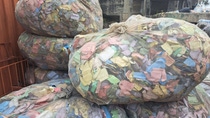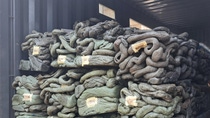To overcome this challenge, we have developed an innovative approach to eliminate air from the polystyrene, transforming it into denser blocks with a density of 960–1050 kg/m³. This allows for easier transportation at standard shipping costs, and enables export to established recyclers. By closing the loop, the polystyrene can be recycled and given new life.
Project Star Nigeria addresses the environmental impact of Polystyrene, offering a viable and sustainable solution for the recycling of single-use polystyrene. The project tackles the density challenge by transforming the material into transportable blocks, reducing shipping costs and enabling export to recyclers. This innovative approach contributes to environmental preservation and the reduction of plastic waste in urban areas.





